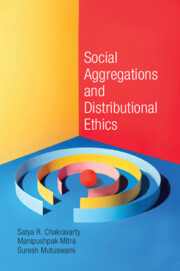Book contents
- Frontmatter
- Contents
- Preface
- 1 Introduction
- 2 Individual and Social Orderings
- 3 May’s Theorem
- 4 Arrow’s Theorem with Individual Preferences
- 5 Relaxing Arrow’s Axioms
- 6 Arrow’s Theorem with Utilities
- 7 Harsanyi’s Social Aggregation Theorem
- 8 Distributional Ethics: Single Dimensional Approaches
- 9 Distributional Ethics: Multidimensional Approaches
- 10 Social Choice Functions
- 11 Strategyproofness on Quasi-linear Domains
- Index
9 - Distributional Ethics: Multidimensional Approaches
Published online by Cambridge University Press: 11 January 2023
- Frontmatter
- Contents
- Preface
- 1 Introduction
- 2 Individual and Social Orderings
- 3 May’s Theorem
- 4 Arrow’s Theorem with Individual Preferences
- 5 Relaxing Arrow’s Axioms
- 6 Arrow’s Theorem with Utilities
- 7 Harsanyi’s Social Aggregation Theorem
- 8 Distributional Ethics: Single Dimensional Approaches
- 9 Distributional Ethics: Multidimensional Approaches
- 10 Social Choice Functions
- 11 Strategyproofness on Quasi-linear Domains
- Index
Summary
MOTIVATIONS
Often income as the sole dimension of the well-being of a population does not give us an appropriate picture of the living condition of the population since there are non-income dimensions that affect human welfare, for example, habitation, longevity, availability of opportunities from the point of view of contentment, and so on. So, by concentrating on income only, it is implicitly assumed that persons enjoying the same income are considered equally well off regardless of their attainments in the non-income dimensions. However, a non-monetary dimension of well-being need not be perfectly correlated with income. For instance, an income-rich person may not be able to improve the level of sub-optimal supply of a local public good, say, the irregularities of a TV signal that can be received within a specified distance of the signaling station. Thus, apart from the distribution of income, a policy maker might be concerned with the distributions of various non-income goods or dimensions. Examples of such non-income dimensions are health, literacy, housing, and environment. Therefore, to get a complete picture of human well-being it is quite sensible to supplement income with non-income dimensions that influence the contentment of the population. In other words the well-being of a population is a multidimensional phenomenon. This is, in fact, a concretization of our assumption made in the earlier chapters that an individual’s (and hence society’s) utility depends on several states of nature.
In the words of Stiglitz, Sen, and Fitoussi (2009, 14):
To define what wellbeing means, a multidimensional definition has to be used… . At least in principle, these dimensions should be considered simultaneously: (i) Material living standards (income, consumption and wealth); (ii) Health; (iii) Education; (iv) Personal activities including work; (v) Political voice and governance; (vi) Social connections and relationships; (vii) Environment (present and future conditions); (viii) Insecurity, of an economic as well as a physical nature. All these dimensions shape people’s wellbeing, and yet many of them are missed by conventional income measures.
Intrinsic to the notion of the capability-functioning approach to the evaluation of human well-being is multidimensionality, where functionings refer to the various things such as income, literacy, housing, life expectancy, communing with others, and so on about which a person cares.
- Type
- Chapter
- Information
- Social Aggregations and Distributional Ethics , pp. 183 - 218Publisher: Cambridge University PressPrint publication year: 2023



